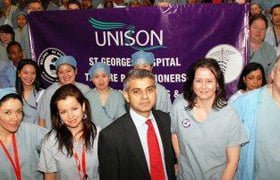Dave Prentis, UNISON’s General Secretary, recently circulated an important NEC document that gives a clear analysis of some of the main threats and problems that the public sector faces as a consequence of the financial and economic crisis.
UNISON Socialist Appeal Supporters welcome the call for branches to discuss the situation, We think its publication reflects a significant development reflecting the huge pressure that the UNISON leadership are under. After all the UNISON bureaucracy has fought hard to "hold the line" for New Labour over the past period. You can read the full document at http://www.unison.org.uk/acrobat/B4288.pdf
There are three major factors that the Union has recognised:
- Falling tax revenues
- A collapse in private investment
- The threat to our pensions
There’s a huge hole in the government’s finances and budgets are going to be squeezed, "adding pressure for further pay cuts, and increasing recruitment freezes and redundancies".
At the same time, years of PFI, Public-Private Partnerships and privatisation mean that many investment decisions in the public sector lie with the private sector. So it’s short term profit that rules. And it’s not there any more.
Pensions are at risk because of the meltdown in the financial markets, and this stokes up problems for the future.
All this affects not only our members but "public services have a vital role to play in protecting individuals, families and communities from the worst effects of an economic downturn".
The document goes on to say that "investment in public services and public infrastructure will be essential to stabilising our economy, maintaining demand and employment, and underpinning future growth".
The public sector isn’t isolated from the rest of the economy, if the economy goes down the tubes, then the public sector will be dragged down as well. The depth of this particular crisis means we are in for a rough ride.
"UNISON therefore calls on the UK government and all relevant regulatory agencies to take bold and principled action to protect the public interest and the living standards of the majority:" They propose:-
- Relief from rising fuel bills via a windfall tax on the energy companies
- Price controls
- Measures to be taken to minimize evictions and homelessness
- Councils to take on threatened homes
- Abandon pay restraint
- Protective measures for pension funds
- 50% of seats for member nominated representatives on the pension boards as promised, and on the LGPS.
- Increased public spending to counteract the downturn in the private sector. "This will necessitate an increase in public debt, currently low by international and historic standards, and a rebalancing of our system of taxation so that corporations and wealthy individuals are required to pay their fair share."
- Return to direct public investment to make up for the shortfall in private investment as well as extending ownership of public service facilities..
"Too often we have seen the market fail to serve the public interest and the public sector forced to step in and pick up the risks created by the private sector – a phenomenon we are now seeing repeated again on a grand scale."
Marxists welcome every reform that improves the lives of working people, and there are some significant measures here. However there are limits to what can be achieved on the basis of capitalism. We are on the brink of a big economic recession, which will undermine any effects that public investment could generate. They also advocate:-
- Cut interest rates and ensure high levels of investment and employment
- Intervention to secure the banking system, they say, should not merely ‘bail-out’ those who have caused this crisis by socialising the losses and taking on unprofitable parts of the sector.
UNISON calls for an end to the ‘bonus culture’ and more regulation of the financial sector, with protection for low paid finance workers’ jobs and conditions. The trouble with that aspiration is that we have no control over what the private managers of the banks actually do.
Nationalising the balance sheet is not genuine nationalisation. The government will receive ‘preference shares’ in the bank that receive the first dividends but don’t have any votes. Only nationalisation of the banks under democratic workers control can guarantee that investment decisions would be taken in the interests of working people.
Casino Capitalism
"UNISON supports the recent declaration of the ETUC that this crisis must mark an end to the ‘casino capitalism’ … The UK has been home to many of the worst excesses of this phenomenon, and is now especially exposed to the fall-out. We therefore also support the statement of the TUC general council calling for a new economic programme for the UK that puts fairness and the needs of the majority first."
All capitalism is casino capitalism. Capitalism is rotten. It’s not merely been hijacked by unscrupulous individuals. The system itself is in crisis. It needs to be replaced with a rational planned economy. We need a socialist programme that provides a genuine alternative to capitalist anarchy. You can’t control what you don’t own
We welcome the publication of this document, although we don’t think it goes any way near far enough. UNISON needs to begin the process of reclaiming the Labour Party. Labour needs to change course and UNISON could be a major player.






